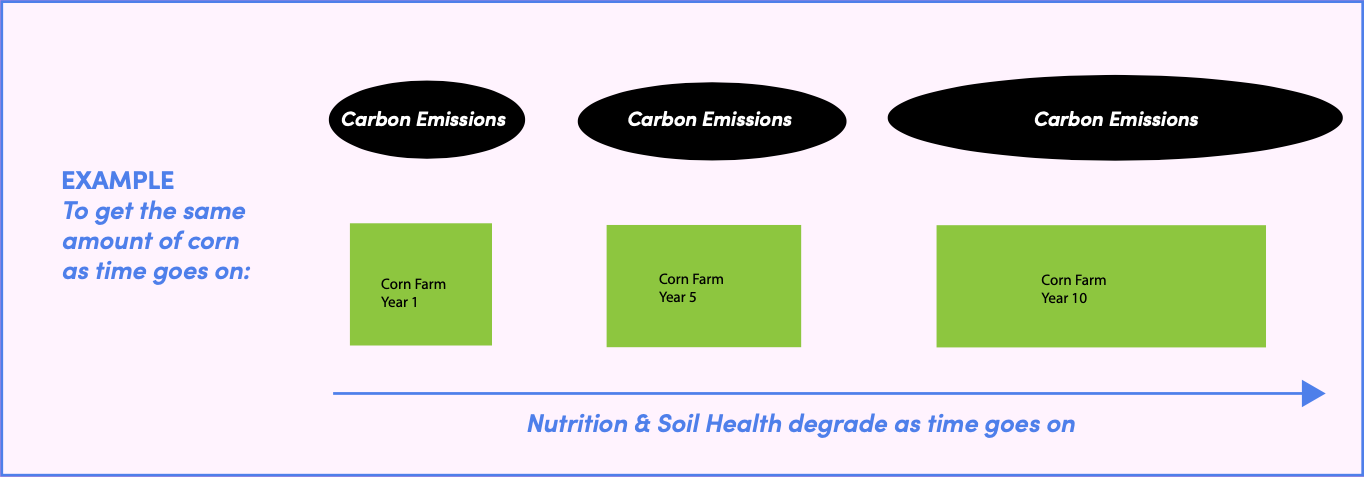It is SOOOO damn important that we support sustainable farmers. Here’s why.
(Oh psst: there’s a 5 question quiz at the end of this page with a discount code for learning why this matters!)
Healthy Soil Will Heal Our Planet
Our founder Emily first fell in love with buckwheat for the crunch and health benefits (read the full story here!), but it was learning about the soil health benefits that possessed Emily with the mission to popularize buckwheat in the U.S.A. Healthier soil = healthier crops for humans, and abundant harvests for generations to come.
55 Years To Save Our Soil
Not to be a doomsdayer, but we have about 55 harvests left to grow food on our soil if we continue using conventional farming practices¹. The number one priority to sustain our planet for generations to come is changing our farming practices to one that nurtures the soil—a practice that not only maintains the soil but improves it over time. This practice is called Regenerative Agriculture.
Regenerative Agriculture (NOUN)
"Regenerative Agriculture describes farming and grazing practices that, among other benefits, reverse climate change by rebuilding soil organic matter and restoring degraded soil biodiversity – resulting in both carbon drawdown and improving the water cycle."
Holistic health fans, this is for you.
Regenerative is basically holistic health for a farm of ranch. A regenerative farmer is thinking about how EVERYTHING on the farm is connected, from the animals to the
flowers to the grains to the bees, ensuring that each part of their ecosystem is nourished. This means you aren’t forcing a supply chain on just one crop because America subsidized it (grr), but you’re nurturing a variety of plants and livestock in a harmonious ecosystem to nurture the soil and reduce carbon emissions.
Why is lack of crop diversity a problem?
We are all about peace, love and harmonious ecosystems, but seriously, supporting these practices should not only make you feel warm and fuzzy, but it’s actually crucial for our future.
How we grow food has a HUGE impact on our planet: Food, agriculture and land use contribute nearly ¼ of all greenhouse gas emissions².
Currently only four crops—sugarcane, rice, corn and wheat, account for more than 50% of all crops grown worldwide (2020 data, FAO). Also, mind you, America grows 25% of the world’s corn and 30% of the world’s soy!! Government subsidies should go to more sustainable crops, but we’ll save that for a strongly worded blog post 😉
Conventionally, a farm plants the same crop every year, usually with heavy fertilizer use and intensive methods to support growth in poor soil. They plant no other crops throughout the year to bring nutrients back into the soil. This degrades the soil from essential nutrients with each harvest. The farm must then plant on more land to yield the same amount of product as time goes on. So they grow on more land, using soil-degrading practices, and since they’re growing on a larger amount of land they’re emitting more greenhouse gasses.

On top of this, since the food isn’t growing in a nutrient rich soil environment, our food literally has less nutrients in it than the same crops grown decades ago. We literally can’t go on like this, both for human and planet health.
Bummer. So how can buckwheat help us?
This concept of crop diversity plays a crucial role in regenerative agriculture, which has the #1 priority to nurture soil health and bring the ecosystem back to life. Cover cropping is an excellent method to increase crop diversity and improve soil, and buckwheat happens to be a fab cover crop!!
Some farms will go as far just to plant a cover crop even if no one’s buying it, but it’s hella labor intensive on top of the cost of seeds, and without anyone buying the cover crop yields, it is just not feasible for many farmers.
Buckwheat Soil Benefits
Flowers Quickly (in 77-90 days) and creates a soil-shielding canopy
Cover crop that surpresses weeds

Attracts beneficial insects and pollinators with its blossoms
Extracts phosphorus from soil, leaving nutrients for future crops

Great on low fertility soil. Rejuvenates over-farmed soils
Buckwheat residue quickly releases nutrients to the next crop

Our First Regenerative Partnership
While Emily was out trying to make buckwheat a “thing”, Luke and Ali Peterson of A Frame Farm were trailblazing the regenerative organic movement from their farm in Minnesota.
In 2021, after just one magical conversation, Emily and Luke knew they were on the same page with their mission to improve soil health in the U.S.
Even though A Frame’s buckwheat price is about double that of conventional buckwheat, it’s the price of doing sustainable business for our future of food. Worth EVERY penny! 💚
So yeah, shop regenerative and local when you can. It really does make a difference!
We hope you learned more about soil health and how buckwheat can help. Test your knowledge: Take the quiz here, and if you complete it, you'll be rewarded with a discount! 💚

